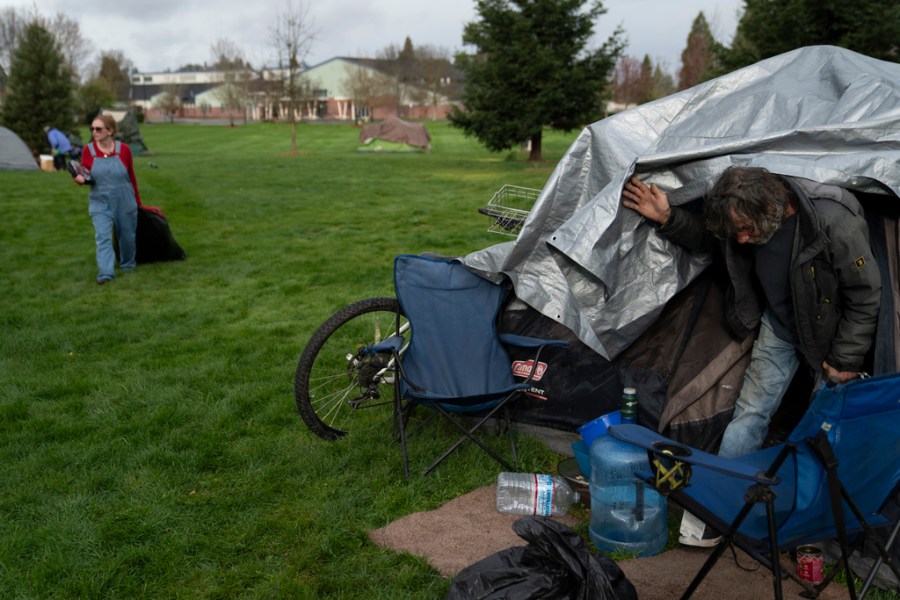(NewsNation) —The Supreme Court has ruled in favor of an Oregon city that wants to impose criminal and civil penalties on people who sleep and essentially live in a public park, creating a landmark precedent for homelessness policies.
In the court’s 6-3 decision for the case Grants Pass v. Johnson, justices argued that the court cannot say that the punishmented by the city qualify as cruel and unusual. It reverses a ruling by an appeals court striking down local ordinances that fined people $295 for sleeping outside.
Justice Neil Gorsuch wrote the majority opinion with Sonia Sotomayor, Elena Kagan and Ketanji Brown Jackson dissenting.
“Such punishments do not qualify as cruel because they are not designed to “superad[d]” “terror, pain, or disgrace,’” Gorsuch wrote. “Nor are they unusual, because similarly limited fines and jail terms have been and remain among “the usual mode[s]” for punishing criminal offenses throughout the country…Indeed, cities and States across the country have long employed similar punishments for similar offenses.”
Writing for the dissent, Sotomayor said sleep is a “biological necessity,” not a crime.
“For some people, sleeping outside is their only option,” she wrote. “The City of Grants
Pass jails and fines those people for sleeping anywhere in public at any time, including in their cars, if they use as little as a blanket to keep warm or a rolled-up shirt as a pillow. For people with no access to shelter, that punishes them for being homeless. That is unconscionable and unconstitutional.”
The Supreme Court’s decision drew criticism from the American Civil Liberties Union, which wrote on X”We cannot arrest our way out of homelessness.” Los Angeles Mayor Karen Bass also weighed in, saying it was a “disappointing” ruling.
“This ruling must not be used as an excuse for cities across the country to attempt to arrest their way out of this problem or hide the homelessness crisis in neighboring cities or in jail,” Bass wrote. “Neither will work, neither will save lives and that route is more expensive for taxpayers than actually solving the problem.”
The Supreme Court heard oral arguments in April. The case reached the high court after the city’s unhoused population brought a suit saying that criminalization of homelessness amounted to an Eighth Amendment constitutional right against cruel and unusual punishment.
They also argued that it violated the Excessive Fines Clause because Grants Pass has no low-barrier shelters to provide services to those with behavioral health or substance abuse issues.
The mountain city, which sits in the southern part of the state, has a population of nearly 40,000. Hundreds of its homeless residents camp in tents and sleep on public benches and picnic tables.
Camping on public property was prohibited under the city’s municipal code, which meant the city could issue citations to homeless residents.

About 600 homeless residents stay in tents and makeshift tarp shelters in the city park, saying they have nowhere else to go.
Grants Pass has been identified by Oregon Housing and Community Services as severely rent burdened, and the city is dealing with a substantial housing shortage, Oregon Public Broadcasting reported.
The city says civil and criminal punishments are necessary for enforcing laws banning homeless people from public spaces. It has been unable to meet the needs of its growing homeless population, the group argued.
After being sued, the city lost its appeal in the 9th U.S. Circuit Court of Appeals, which upheld the lower court’s decision in favor of the unhoused.
During oral arguments in front of the Supreme Court, a lawyer representing Grants Pass told the court that cities nationwide rely on “camping laws to protect its public spaces.”
The attorney added that the appellate court tied the city’s hands “by constitutionalizing the policy debate over how to address growing encampments.”
The unhoused argued Grants Pass defines a “campsite” as anywhere a homeless person is with a blanket, making it “physically impossible for a homeless person to live in Grants Pass” without facing the prospect of fines and jail time.
The decision is poised to have wide-reaching implications for the nation’s homeless population and how cities can manage their unhoused residents.
“Camping bans” have been implemented across the country, including in Los Angeles and San Diego.
Several states like Texas, Tennessee and Florida have also tightened restrictions.
Other cities, including Milwaukee, Las Vegas, Seattle and Providence, Rhode Island, filed a brief in the Supreme Court case supporting Grants Pass.
Homelessness hit a record high last year due in part to a “sharp rise” in the number of people who became homeless for the first time, according to a report from the U.S. Department of Housing and Urban Development.
